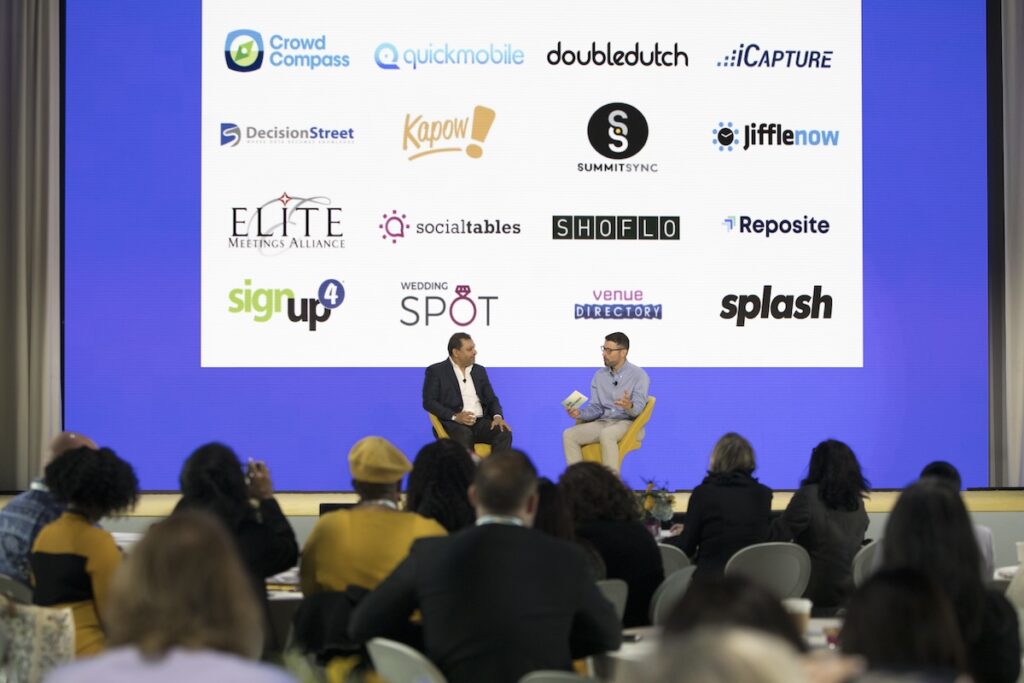
At the 2024 Skift Conference Forum, Cvent CEO and founder Reggie Aggarwal reflected on the company’s evolution from a humble startup to a giant in the event technology space. The conference theme, “Event Tech from David to Goliath – What happens next?” explored the key trends shaping the industry and how Cvent plans to lead the future.
Artificial Intelligence: Great Promises, Limited Returns—For Now
Agarwal doesn’t shy away from the hype surrounding artificial intelligence and admits Cvent isn’t quite where it wants to be. “As far as artificial intelligence is concerned, the answer is absolutely no. We still have a long way to go,” he said. Although Cvent has invested heavily in artificial intelligence, with 200 employees focused on AI projects, Agarwal remains pragmatic. The current returns, while significant, are small. “Currently we have about 1,400 technical people. It gives us about a 5% improvement, but it will grow every year.
Despite the modest returns so far, Agarwal remains bullish on the potential of artificial intelligence. Cvent provides users with some artificial intelligence capabilities when finding venues, creating content, and analyzing data. However, he warned that the wider impact of artificial intelligence has yet to be proven. “There’s a lot of hype,” he noted, but he firmly believes that over time, the benefits, especially in terms of efficiency, will be undeniable.
Drive personalized event experiences
The future of event technology involves not only artificial intelligence but also data-driven personalization. Cvent is working to improve its matching capabilities to match attendees with other relevant attendees, content and exhibitors.
Agarwal emphasized the importance of collecting enough high-quality data, which may only be possible with customers who give users the option to share data across multiple events. “What we really need to do is make sure we collect data,” he said. “When you build a profile like this, people feel more comfortable and they say, ‘Hey, if I post this data about myself, it will actually help me meet other people.'”
The smarter the system, the better the match. But Agarwal said it’s up to event planners and platforms like Cvent to ensure attendees see the value in sharing information.
Cvent’s acquisition strategy
Aggarwal’s growth strategy relies heavily on acquisitions, and Cvent has proven itself A savvy player in the M&A space. Most recently, it acquired New York-based event marketing technology company Splash. Aggarwal described Splash as “best in class” and “very strong in enterprise marketing.”
While Aggarwal did not comment on recent acquisition plans, he described Cvent’s acquisition record as “agnostic” and its willingness to integrate any technology brought in.
However, he admits there are pitfalls in acquiring the game. “Sometimes you buy a company, and once you get to know it better [..] They are not built for scale, and their security is not built for scale. Aggarwal believes Cvent’s track record remains strong and it is focused on integrating companies that delight customers, having made at least 18 acquisitions. “When we hear 20 customers say, ‘We love this product,’ we want to do something that makes them happy.”
Evolving venue procurement platform
Cvent’s online purchasing tool, Cvent Supplier Network, is a key pillar of the company’s strategy and accounts for approximately one-third of total revenue. Aggarwal revealed that the platform is expected to handle approximately $18 billion worth of bookings this year. Still, he sees plenty of opportunity for growth, estimating that only 15% to 20% of planners currently use online purchasing tools.
He also sees huge potential for AI to streamline online venue sourcing, including helping planners find venues and hoteliers respond to the 3 to 5 million requests for proposals received through the platform.
Multi-year contracts turn COVID-19 challenges into opportunities
Agarwal credits the multi-year contract with helping Cvent weather the pandemic. The company works with clients to adjust their commitments and extend contracts in exchange for short-term flexibility. “We said, ‘If we reduce your commitment, can you extend the contract?'” This approach keeps customers on board and helps stabilize the business during turbulent times.
The pandemic has tested every level of the events industry, and Cvent is no exception. Cvent has 18,000 customers, most of whom are in crisis, and must pivot quickly to survive. “All my events are canceled. If you can’t give me virtual, then we want to go somewhere else,” Agarwal recalled what the customer told him.
Virtual events are here to stay
Cvent responded by developing its virtual offering and launching it at its own conference, Cvent Connect. This is a trial by fire. “For us, it was a bit like landing on the moon,” Agarwal said, noting that the event attracted 52,000 virtual attendees. This year, the conference attracted approximately 4,000 in-person attendees and 6,000 online attendees.
Agarwal believes that while live events have picked up, virtual and hybrid events are now a permanent part of the mix. “Virtual technology is here to stay. It makes the power and power of events even more powerful because you’re able to reach a larger audience.
However, he is well aware of the limitations of virtual events. While they are great for short webinars, face-to-face events still have a more significant impact. “If I had to put a number, I would say the impact in person is 3 to 5 times greater than the impact virtually.”
Despite his success, Agarwal remains passionate about the company he founded nearly 25 years ago and has no plans to retire anytime soon.

